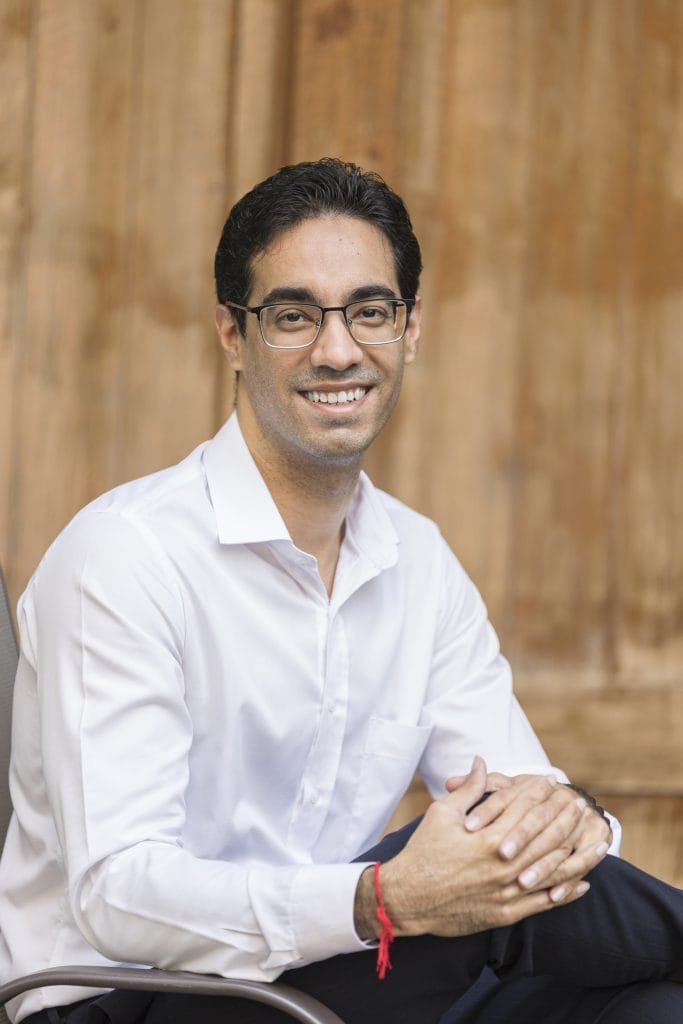He’s on the leafing edge of a fast-growing field.
By Aiden Jewelle Gonzales
“It’s estimated that cannabis, Thailand’s new economic hero, will have a market value of THB 21 billion by 2024,” Shivek Sachdev tells me as he walks me through a presentation of what they do at Cantrak, the country’s leading seed-to-sale software for cannabis. “I think that’s an understatement – it’ll be worth a lot more. Sooner rather than later, more and more people from different industries will want to jump in. Even many in real estate are looking to join the cannabis business now, because it’s easy to convert their real estate into a hemp and cannabis clinic – all they’ll need to do is get a license.”
The Product Owner at Cantrak, Shivek had not always put his keen entrepreneurial mind towards the cannabis business, or even running a tech company, despite being clearly impassioned now about this literally budding industry. Born in Thailand as a second-generation Thai-Indian, he went to NIST International School before graduating with a Bachelor’s degree in Computer Science from Bangalore University, India, on a prestigious government scholarship. After coming back to Thailand, he joined illustrious consulting firm Deloitte, dealing with enterprise risk management, while juggling a finance degree in Chulalongkorn University.
Despite this background, he chose not to follow the finance path and instead opened OMG Experience, an aviation company that became the official representative of Bhutan Airlines in Thailand. “We were a General Sales Agent (GSA) – basically, the airline appointed our company to act on their behalf, so we would handle their sales, operations, marketing, and even administration and legal matters,” he explained. However, as with most businesses that dealt with travel, disaster struck in the form of the pandemic, and they had to temporarily suspend their operations in February 2020.
Despite the hand he was dealt with, Shivek immediately knew that he had to pivot immediately for the sake of the business and his staff. “That was the point in my life when I had to utilise my background in computer science,” he recalls. “Because of this background in technology, I knew it was an industry that would keep growing despite the pandemic. I set a up a tech company called ServiceMind Asia in 2020, a property management system, which is now used by major managers in Thailand, and more than 80 buildings around Bangkok.
When transitioning into a tech company, I tried to reskill as many of my original staff to the new company, as a lot of the roles could translate well. That way we were being responsible, we didn’t have to fire anyone; we didn’t even have to reduce their pay.” And this investment in his staff paid off – “We just got promoted by the Board of Investment of Thailand,” he says with no small amount of pride. However, he tells us, ServiceMind was “a late player in the property management industry” and despite getting consistent revenue from customers, and doing well because they managed to “pick and choose amongst the most practical tech solutions to deploy,” he wanted to be at the vanguard of an industry. Thus, Cantrak was born. He speaks to Masala further about what they do, and how this is going to change the face of the cannabis industry.
Tell us a little more about Cantrak, how you marry tech and innovation together, and why you decided to explore the cannabis industry.
Cantrak is our new product, which we launched last year. Most people are interested right now in what they call the new S-curve business, which is cannabis. Cantrak is a hemp and cannabis seed-to-sale software platform that simplifies cannabis regulatory reporting with the Thai FDA. I even got myself certified through Amazon Web Services as an AWS certificate solutions architect. This gets me recognition in the industry.
Despite not having a background in hemp cultivation and consumption, we realised that this industry is going to open up, and it was similar to Service Mind. But this time, we already had the foundation of being a tech company, and all we needed to do was apply the same concept to hemp and cannabis. This time, we’re an early player. I researched what was being done in the US, and I saw that the seed-to-sale system was really popular amongst those growing hemp and cannabis.
To have an advantage in this industry, you’ll have to link your system with the government system, because it’s regulated by the FDA. We provide a platform for industries to manage and perform daily tasks, industry and waste management, cultivation, tracking the harvest and sales, etc. through our system. We’re basically an end-to-end platform, aside from acquiring the actual licenses.
Who or what is your target market? Will individuals be able to make use of your platform once they can also grow cannabis in the not-too- distant-future?
We mostly target businesses that grow and import seeds, cultivate hemp and cannabis, and extract derivatives from the product; big players essentially. The idea is to get at least five customers first, and then really amplify this concept of seed-to-sale in Thailand. Right now, we’ve managed to get three customers in the span of two months.
What we’re hoping to eventually do is to increase competitiveness for smaller growers. A single big player can grow more than 16,000 plants a year – even up to 50,000 plants a year! The market’s going to be cornered again. We’ll need to somehow provide the smaller players with a tech advantage, which is where Cantrak comes in. Right now, we’re not targeting individuals as yet, despite the new FDA regulations.
Thailand is at the vanguard of the cannabis industry in SE Asia, since its legalisation of hemp products a couple of years ago, as well as the de facto decriminalisation of cannabis just recently. Can you weigh in on this, as well as what further inroads in other industries you foresee it will make?
In my opinion, it’ll take a lot more in terms of government regulations, but we’re mostly focusing on commercial and industrial use. My prediction is that commercially, next year, you’ll probably see a big jump. Because most of the crops will be harvested this year, a lot of new players will jump into the market, so you’ll see what the actual size of the cannabis market will be, and you’ll see a lot more of the end products in the market.
Over the years, what accomplishments are you most proud of?
Not having to fire anyone from the aviation business; I kept most of my core team – some left because they found it difficult adapt to the tech industry, but I provided them with the training, and we’ve re-skilled all our staff, and a lot of them don’t even want to go back to aviation; they’re happy in tech because they see a lot of potential in the industry.
I’m also incredibly persistent and that’s served me well. For example, how I managed to get in touch with the FDA was flying to Buriram for a big hemp and cannabis exhibition there. I barged into the FDA officials’ office, and I introduced myself and told them what I was working on.
I gave them my name card and asked them for their LINE contact details. I was so persistent that I got those contacts, we went on with the whole development, and we managed to link our system to them, and I think currently we’re the only one who have this system linked to the Thai FDA.
Can you tell us about your biggest challenge over the years and how you overcame it?
Juggling multiple tasks is something I find challenging. Apart from this, I also teach on Saturdays and Sundays in Mahidol University as a professor, in a subject called AI for Management Students. With Service Mind, we’re taking on a lot of boostrap projects and we’re still maintaining it and grow it. Cantrak was just launched last year, and we’re trying to build it along the way.
For me, jumping back to IT is like starting from zero again. The challenge is to get up to speed, so the last few years I’ve been taking a lot of courses in machine learning, in AI, just to get up to speed on what the industry is talking about right now so we can provide services to customers.
What is the most important role of a business leader and CEO, in your opinion?
Training. It’s the most important thing I can think of right now; training the team and knowledge transfer to the team. When you transfer knowledge you can start delegating your tasks, and you can switch from operations to management. These first few years, I’m still under operations, still the Project Manager, still in design, etc. But at the very same time, I’m trying to manage the business as a whole, and to get me up to that speed, I have to upskill people.
How do you accomplish so much in the little time you have, and how do you take a break from it all?
Having a proper To-Do list and always knowing what task is delegated to who. It’s also about following up. I use tools like Asana to track all my tasks and assign them to my team. I spend my evenings preparing for the next tasks for the next week, and I try to complete tomorrow’s tasks today.
I also do what I call a brain dump – where you dump everything in your brain on to paper because the brain is better for processing than remembering things.
I’m pretty lucky that my interests are related to my job; people think I’m relaxing, but actually I’m learning new developments for my work as well. My hobbies on a Saturday and Sunday are to go through companies’ financial statements and invest in equity and stock markets. I have a background in finance, so why not find a hobby that makes money? [Laughs] Overall, just do what you love.








